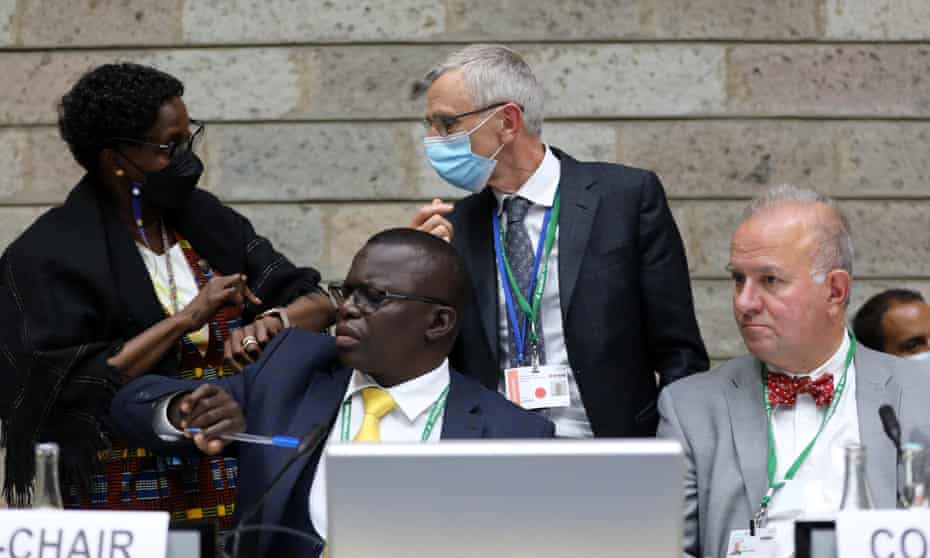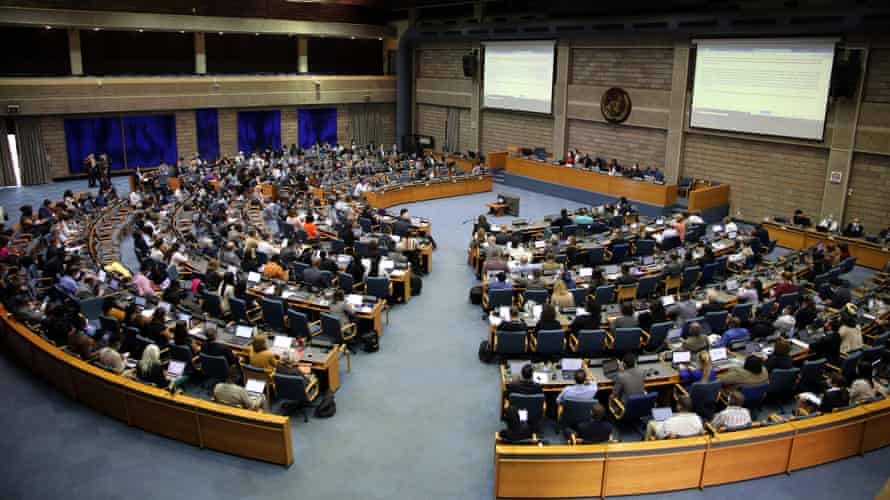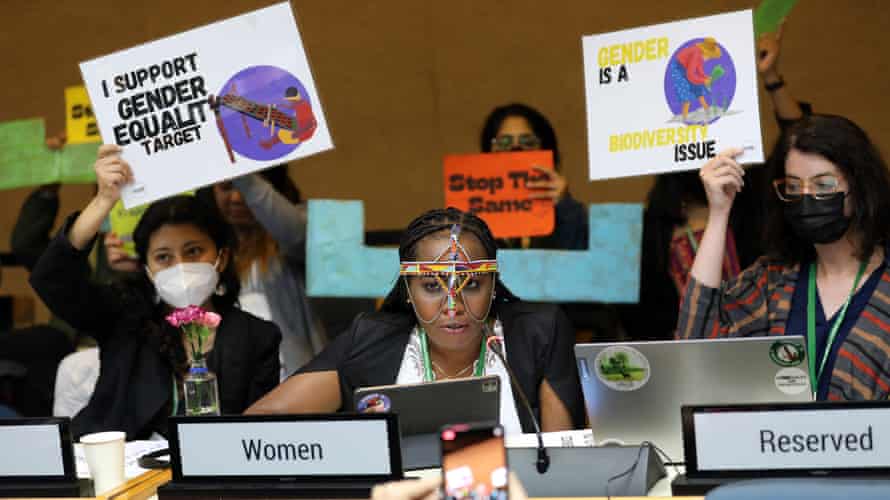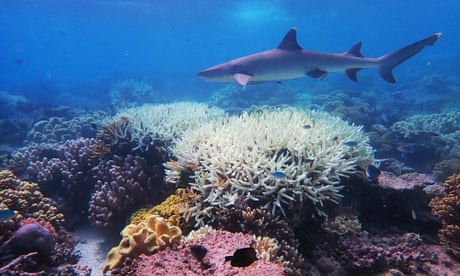Nairobi biodiversity talks end in stalemate, prompting open letter to world leaders calling for action before Montreal conference

On the dais in Nairobi, from left: UN biodiversity head Elizabeth Maruma Mrema, CBD executive secretary Francis Ogwal, and co-chairs David Cooper and Basile van Havre. Photograph: IISB
Patrick Greenfield and Peter Muiruri in Nairobi
Patrick Greenfield and Peter Muiruri in Nairobi
THE GUARDIAN
Tue 28 Jun 2022
UN biodiversity negotiations have reached crisis point due to a lack of engagement from governments, leading NGOs have warned, three years after experts revealed that Earth’s life-support systems are collapsing.
Last week, countries met in Nairobi for an extra round of talks on an agreement to halt the human-driven destruction of the natural world, with the final targets set to be agreed at Cop15 in Montreal. Governments have never met a target they have set for themselves on halting the destruction of nature despite scientists warning in 2019 that one million species face extinction, and that nature is declining at rates unprecedented in human history.
While world leaders including Emmanuel Macron, Justin Trudeau and Boris Johnson have underscored the importance of the summit, which only takes place once a decade, the biodiversity negotiations have seen substantial divisions between the global north and south over money, proposals to protect 30% of land and sea by 2030, and implementation of any agreement. The Africa group warned it would not sign off the final post-2020 global biodiversity framework unless it includes a target on digital biopiracy.
In an open letter published on Monday, environmental groups including Greenpeace, Avaaz, the Campaign for Nature and the International Indigenous Forum on Biodiversity said progress on the final deal was not being made, and the talks lacked high-level political engagement. In the run-up to any Cop, negotiations are largely handled by technical specialists in the initial phases, with ministers typically getting involved at the end of talks.
The letter calls on the UN secretary general, António Guterres, and government ministers to inject political leadership into the process and avert disaster at Cop15 in Montreal in December. China will oversee the event as president after its zero-Covid policy forced organisers to move the summit earlier this month.
“Negotiations have become stagnant, and the post-2020 global biodiversity framework is in peril,” the letter reads. “Countries had once pointed to Cop15 as an opportunity to deliver a global deal for nature and people, similar in significance to the Paris climate agreement, but there is a notable absence of the high-level political engagement, will and leadership to drive through compromise and to guide and inspire the commitments that are required.”
UN biodiversity negotiations have reached crisis point due to a lack of engagement from governments, leading NGOs have warned, three years after experts revealed that Earth’s life-support systems are collapsing.
Last week, countries met in Nairobi for an extra round of talks on an agreement to halt the human-driven destruction of the natural world, with the final targets set to be agreed at Cop15 in Montreal. Governments have never met a target they have set for themselves on halting the destruction of nature despite scientists warning in 2019 that one million species face extinction, and that nature is declining at rates unprecedented in human history.
While world leaders including Emmanuel Macron, Justin Trudeau and Boris Johnson have underscored the importance of the summit, which only takes place once a decade, the biodiversity negotiations have seen substantial divisions between the global north and south over money, proposals to protect 30% of land and sea by 2030, and implementation of any agreement. The Africa group warned it would not sign off the final post-2020 global biodiversity framework unless it includes a target on digital biopiracy.
In an open letter published on Monday, environmental groups including Greenpeace, Avaaz, the Campaign for Nature and the International Indigenous Forum on Biodiversity said progress on the final deal was not being made, and the talks lacked high-level political engagement. In the run-up to any Cop, negotiations are largely handled by technical specialists in the initial phases, with ministers typically getting involved at the end of talks.
The letter calls on the UN secretary general, António Guterres, and government ministers to inject political leadership into the process and avert disaster at Cop15 in Montreal in December. China will oversee the event as president after its zero-Covid policy forced organisers to move the summit earlier this month.
“Negotiations have become stagnant, and the post-2020 global biodiversity framework is in peril,” the letter reads. “Countries had once pointed to Cop15 as an opportunity to deliver a global deal for nature and people, similar in significance to the Paris climate agreement, but there is a notable absence of the high-level political engagement, will and leadership to drive through compromise and to guide and inspire the commitments that are required.”

Delegates meet in Nairobi, Kenya, last week to hammer out agreements in the run-up to Cop15 in Montreal. Photograph: IISB
During six days of talks last week, negotiations saw little agreement among countries over the final text, which includes draft targets on eliminating environmentally harmful subsidies, reducing pesticide use, and action on invasive species in an effort to cut extinction rates. Scientists warned again in 2020 that the sixth mass extinction of wildlife on Earth is accelerating.
A further round of pre-Cop15 talks has been scheduled in the days before the summit, which starts on 5 December and concludes on 17 December, the day before the football World Cup final.
If adequately funded and implemented in full, the agreement could see major changes to global agricultural practices and extractive industries, both major drivers of the eradication of wildlife and natural ecosystems.
It had been hoped that countries would use the extra round of talks in Nairobi to hammer out points of division ahead of Cop15. Yet one negotiator, speaking to the Guardian on the condition of anonymity, said they left the talks seeing more division.
“When the meeting ended yesterday, everyone was really frustrated. Many people were expecting to move forward, at least on some of the targets. It should be a wake-up call and might raise awareness among ministers that they need to find a way out of this conundrum,” they said.

During six days of talks last week, negotiations saw little agreement among countries over the final text, which includes draft targets on eliminating environmentally harmful subsidies, reducing pesticide use, and action on invasive species in an effort to cut extinction rates. Scientists warned again in 2020 that the sixth mass extinction of wildlife on Earth is accelerating.
A further round of pre-Cop15 talks has been scheduled in the days before the summit, which starts on 5 December and concludes on 17 December, the day before the football World Cup final.
If adequately funded and implemented in full, the agreement could see major changes to global agricultural practices and extractive industries, both major drivers of the eradication of wildlife and natural ecosystems.
It had been hoped that countries would use the extra round of talks in Nairobi to hammer out points of division ahead of Cop15. Yet one negotiator, speaking to the Guardian on the condition of anonymity, said they left the talks seeing more division.
“When the meeting ended yesterday, everyone was really frustrated. Many people were expecting to move forward, at least on some of the targets. It should be a wake-up call and might raise awareness among ministers that they need to find a way out of this conundrum,” they said.

Sharon Ruthia, of the Environment and Natural Resources Foundation, at the Nairobi talks last week. Photograph: IISB
Elizabeth Maruma Mrema, the UN’s biodiversity head, urged governments to work together on the agreement ahead of Cop15 to help reach consensus. “I call upon the parties, in the next months, to vigorously engage with the text, to listen to each other and seek consensus,” she said.
Basile van Havre, a co-chair for the UN convention on biological diversity (CBD) negotiations, said he was not as negative as others about the state of talks but agreed that ministerial input was important. “People came prepared. Delegates worked really hard and there was no blocking. The challenge we have is that there are a lot of difficult issues.

World fails to meet a single target to stop destruction of nature – UN report
“We made progress but we are not where we need to be. We need ministers to get involved and give negotiators technical mandates to advance,” he said.
Top talking points from Nairobi
A quiet China When delegates travel to Montreal this December, Beijing will still hold the presidency of the much delayed Cop, even though it will be hosted from Canada, not Kunming as originally planned. China has so far played a largely passive role in negotiations and did so again in Nairobi.
African scepticism on 30x30 Several world leaders have put forward proposals to protect 30% of land and sea as a key target of the agreement. But many African countries have indicated that the goal will not make the final text without a substantial financial commitment from the wealthy global north.
Brazil accused of undermining talks At the end of the talks on Sunday, Marco Lambertini, director general of WWF International, accused Brazil of “actively working to undermine the negotiations”. Cop15 could become another chance for Bolsonaro to add to his destructive environmental legacy.
Elizabeth Maruma Mrema, the UN’s biodiversity head, urged governments to work together on the agreement ahead of Cop15 to help reach consensus. “I call upon the parties, in the next months, to vigorously engage with the text, to listen to each other and seek consensus,” she said.
Basile van Havre, a co-chair for the UN convention on biological diversity (CBD) negotiations, said he was not as negative as others about the state of talks but agreed that ministerial input was important. “People came prepared. Delegates worked really hard and there was no blocking. The challenge we have is that there are a lot of difficult issues.

World fails to meet a single target to stop destruction of nature – UN report
“We made progress but we are not where we need to be. We need ministers to get involved and give negotiators technical mandates to advance,” he said.
Top talking points from Nairobi
A quiet China When delegates travel to Montreal this December, Beijing will still hold the presidency of the much delayed Cop, even though it will be hosted from Canada, not Kunming as originally planned. China has so far played a largely passive role in negotiations and did so again in Nairobi.
African scepticism on 30x30 Several world leaders have put forward proposals to protect 30% of land and sea as a key target of the agreement. But many African countries have indicated that the goal will not make the final text without a substantial financial commitment from the wealthy global north.
Brazil accused of undermining talks At the end of the talks on Sunday, Marco Lambertini, director general of WWF International, accused Brazil of “actively working to undermine the negotiations”. Cop15 could become another chance for Bolsonaro to add to his destructive environmental legacy.
No comments:
Post a Comment